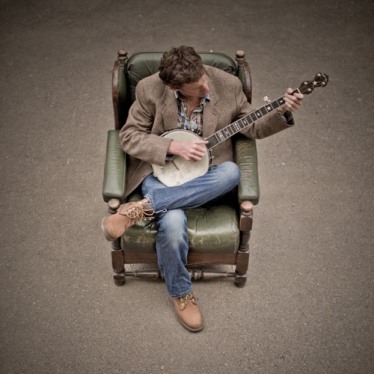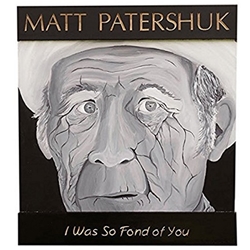
It’s been a while since we’ve heard from Doghouse Roses, the duo of Iona MacDonald and Paul Tasker whose two albums and several EPs showcased Tasker’s mastery of the acoustic guitar and MacDonald’s sublime singing voice. Collaborations with The Willard Grant Conspiracy and shows with acts as disparate as Raul Malo and Pokey LaFarge culminated in the excellent 2010 album This Broken Key, described by one reviewer as, “Perfection, or as near to perfection as we might reasonably expect.” Since then however the band have kept a low profile, only surfacing for the occasional gig until, galvanised by a support slot for US cult rockers, Television, they went back into the studio in 2015 and also embarked on a tour of Germany. A tour only EP was released but now they have a new album (Lost Is Not Losing) in the can and will be playing a set of dates in April. In addition, Tasker is releasing a solo album, an all instrumental record called Cold Weather Music, at the end of this month. In anticipation of this flurry of activity Blabber’n’Smoke managed to meet up with Paul Tasker to speak with him about his album but we kicked things off by asking for an update on the Doghouse Roses album.

It’s been nearly six years since Broken Key. What have the band been up to in that time?
We worked really hard from 2007 through until about 2011 and we really just burned out, we weren’t really enjoying it anymore. We didn’t stop as such, we still did small gigs here and there. There was never a plan to start it up again but then some serious gigs were offered to us including a BBC television slot and we enjoyed rehearsing and playing again and some new songs came out of that so we decided to give it another go. As I said, we never stopped but we didn’t have the heart back then to go through the stuff to make another record because if you’re going to do that you really need to want to do it. It’s a lot of work and there’s a lot of obstacles. So we eventually decided to go into La Chunky studios in Glasgow’s Hidden Lane and we worked with Johnny Smillie for four days, we had a German tour booked at the start of 2015 so we did a tour only EP for that. After that we recorded the album with some guests on it, Laura Beth Salter on mandolin and Dejan Lapanja from Slovenia on guitar. We have bass and drums from Steff and Craig from the New International and Jo Shaw and John Alexander are also on the album. Playing as a duo live is one thing but on a record, well, the pinnacle is Gillian Welsh and Dave Rawlings but look how much they’ve played live together and yet they only do an album every six or seven years. I think it’s difficult to hold interest throughout a duo type album.
Is there a release date for Lost Is Not Losing?
It’s finished but because I’ve got my album coming out we don’t want to release this one until later in the year and we want to have a properly thought out plan leading up to that. That was one thing about Broken Key, we didn’t really have a plan. We just put it out and hoped for the best but it’s a hard world out there and things just get lost. You really need to start the ball rolling, the PR stuff from the moment you get into the studio. I really don’t check out stuff like Facebook as much as I should but you can see bands there who are constantly updating what’s going on, what they’re doing and, needless to say we didn’t do that. Now we have a news page on the website but people have to find that whereas Facebook finds you. We’re hoping for a November release but a lot depends on our touring plans as we want to be able to promote it properly.
So after six years can we expect a different sounding Doghouse Roses?
Well, when me and Iona recorded this we did it live, sitting next to each other and it worked out really well. Before, when we recorded, we were separated, we could see each other but we weren’t close together and I think that’s made a difference. The majority is acoustic guitar and voice with four songs featuring a band. It’s still us writing the songs but I think it sounds a bit different, a bit fresher. And we recorded it using all sixties gear so that adds something to the sound.
I thought the song you’ve previewed from the album, Diesel Engine, had a “retro” feel to it, a nice early sixties, even fifties snap.
I bought a 1958 Harmony Rocket and I used it on Diesel Engine and it has that sort of sound. It was a really strummy number when we did it live but when we were recording it we slowed it down so it had a kind of groove rather than a drive and I put probably far too many guitar layers on it. But there’s some nice harmonies in there. I’m working with another band, Colour Of Whisky which is like a vocal band so we got all them in to do harmonies. It turned out quite nice.
While we’re waiting for the April shows from the band and the release of Lost Is Not Losing there’s your solo album, Cold Weather Music, to look forward to. Can you tell us about that?
It’s been a couple of years in the making. I’ve basically made the album three times now. The first time was in 2010 but it I really didn’t get down what I was hoping for although it was a good learning curve of sorts. So I tried again in 2012 with Luigi Pisquini, a recording engineer, and we hired this place called the Recording Cottage in Inveraray. This time it was closer but still not quite there although a couple of the tracks from this session are on the album. Eventually I ended up at Green Door studios, an old analogue recording place and it was just the right space so essentially I’ve made the album three times before being happy with it. It’s all instrumental, two of the tunes, Husker’s Theme and Tundra Plane feature banjo, Sky Train and Ne’er Day are duets with flute and guitar, Blooms in the Autumn and InE are guitar duets, that’s me and Dejan, and the others are just me on guitar.
I believe that you’ve said that it’s like a soundtrack for a movie that hasn’t been filmed.
Well when I was working on some of the pieces, James Morrison at Whisky and Milk was writing a screenplay for a Western and he asked me if I had some music that sounded American as well as Scottish so I tried a few things on the banjo and one of them turned into Husker’s Theme. I worked from some pictures James had taken and I tried to evoke the scenes and we took a little road trip up to the Highlands and that’s where most of the artwork in the album comes from. So yes, it’s a bit like a soundtrack for a film that, as you say, hasn’t been made yet.

Why’s it called Cold Weather Music.
When we were away in 2009, I think it was in Denmark, someone came up and said, “You guys play cold weather music, no one would ever think you come from a place like Spain” and I quite liked that. A lot of the music I like, people like Ólafur Arnalds, you can tell it’s from a cold country. Although I like Samba and Tango and such I can’t really relate to it.
Aside from the album being available as a CD and digital download you’re also releasing it on vinyl. I take it that you’re a fan of the format.
I actually got into records just when it was changing over to CDs. There was a place called Borderline in Galashiels and one day I went in and instead of just having the odd piece of vinyl they had boxes and boxes of it. Someone had traded in their collection and there were some classic records there. I remember there used to be a ton of records shops on Byres Road, you could do a record shop crawl. Those days are gone although they do seem to be coming back in a small way.
The album’s a wonderful evocation of the landscapes featured in the photographs, the banjo and pedal steel adding, as you said, an American touch to the Highland mists. It will probably surprise folk who always compare your playing to the likes of Bert Jansch.
Well Jansch was my first touchstone. That’s who I wanted to sound like when I first started playing but these days I’ll find myself playing something and I’ll think, “Oh, that’s just like third rate Jansch,” so I’ll cut that bit out. When I started to play it was the height of Brit Pop and I thought that was god-awful and then I saw Jansch at The Press Club on West Nile St. and I thought he was brilliant. Before that I had no real direction to follow on the guitar but after that show I tried to find his albums. Back then Bert and a lot of others like him were having a real dip in popularity, I mean there were only about 30 people at the gig and his records were hard to find. But I got as many as I could find and to me it was a whole new mysterious world of playing the guitar, trying to figure out how he did that and then trying yourself to do it. And so when I started writing songs I wasn’t actually lifting his stuff but I was “borrowing” things so that the first Doghouse Roses songs did have that Jansch type sound to them.
What guitarists do you listen to these days?
Well these days I think I listen to more piano players than guitarists. I really like Nils Frahm and Oscar Peterson. When I play guitar these days I try to think of it more as a piano than a guitar
So 2016 is looking to be a busy year for you.
Well first off, we’ve got Joseph Parsons coming over from the US and we’re doing four shows with him in April. It will be nice to get out and get back to playing; Iona’s really looking forward to the shows. I’m so glad to have the solo album done, it had become a bit of a millstone, but I’ll be playing some of the tunes from the album at these shows. I’m also doing a solo show on the 15th at Woodend and then hopefully later in the year I’ll be able to gather all the players for a show to play the album in full. After that we can concentrate on the run up to the release of Lost Is Not Losing.
Dates for Doghouse Roses April shows are here. Blabber’n’Smoke’s review of Paul Tasker’s Cold Weather Music will be here soon, in the meantime he’s playing at Woodend Bowling Club for Sounds In The Suburbs tomorrow, 15th March supporting Locust Honey. You can buy his album here
Doghouse Roses website














